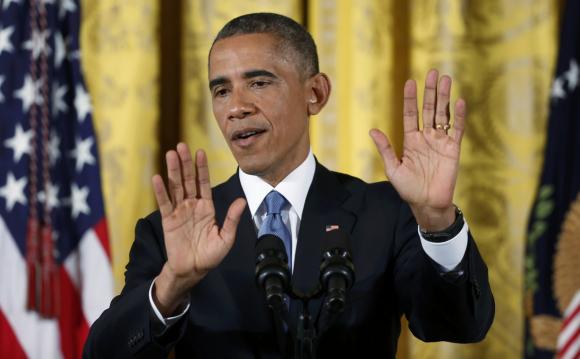
CREDIT: REUTERS/LARRY DOWNING
(Reuters) – U.S. President Barack Obama acknowledged on Wednesday that “Republicans had a good night” with sweeping election victories in Congress and said he got a message from voters that it was his responsibility to break a Washington gridlock.
Republicans seized control of the U.S. Senate in Tuesday’s election and captured their biggest majority in the House of Representatives in more than 60 years. The party also won more than half of the 36 governors’ races.
“As president, I have a unique responsibility to try and make this town work,” the president, a Democrat, said at a White House news conference. “So, to everyone who voted, I want you to know that I hear you.”
The president, whose unpopularity made him unwelcome to many fellow Democrats running for office, plans to meet congressional leaders from both parties at the White House on Friday to take stock of the new political landscape.
On Wednesday, he spoke with Kentucky Senator Mitch McConnell, who is poised to become the Senate’s new majority leader, and with House of Representatives Speaker John Boehner.
“I told them both that I look forward to finishing up this Congress’ business and then working together for the next two years to advance America’s business,” Obama said.
At a news conference earlier, McConnell said he believed Obama was interested in moving forward on trade agreements and tax reform, two issues at a Washington standstill in the face of political differences.
“This gridlock and dysfunction can be ended. It can be ended by having a Senate that actually works,” McConnell said.
Despite the Republican gains, the election was not necessarily an endorsement of Republican policies. Initiatives championed by Democrats to raise the minimum wage and legalize possession of small amounts of marijuana succeeded in a handful of states where they were on the ballot.
With the bulk of election results in, the dollar surged to a seven-year high against the yen and the Dow and S&P 500 finished at record closing highs, reflecting optimism about pro-energy and other business policies.
BIGGEST GOP HOUSE MAJORITY SINCE 1940s
When the new Congress convenes in January, Republicans will be armed with their biggest majority in the House since Democratic president Harry Truman’s first term in the late 1940s.
The Republican takeover will force Obama to scale back his ambitions to either executive actions that do not require legislative approval, or items that might gain bipartisan support, such as trade agreements and tax reform.
It also will test his ability to compromise with newly empowered political opponents who have been resisting his legislative agenda since he was first elected in 2008. Americans elected him to a second and final four-year term in 2012.
One of the first tests could be a bill to approve the Keystone XL crude oil pipeline from Canada, a project about which Obama has voiced reservations. Republican Senator John Hoeven said in an interview on Wednesday that he has enough votes to pass a bill early in 2015 that would approve TransCanada’s long-languishing $8 billion pipeline project.
“It’s really a good chance to see if the president’s willing to work with us,” Hoeven said.
Energy markets hope Republican control of the Senate will lead to reform of crude and natural gas export laws and motivate the Obama administration to include those energy exports in new, or broader, trade agreements.
Partisan battles could erupt over immigration reform, with Obama poised to issue executive actions by year’s end to defer deportations of some undocumented immigrants.
REPUBLICAN ROUT
A one-term senator before he became president, Obama has often been faulted for not developing closer relations with lawmakers, particularly with McConnell, who won a tough re-election battle against Democrat Alison Lundergan Grimes.
McConnell will replace Democrat Harry Reid as Senate majority leader. Reid has been one of Obama’s top political allies and helped steer the president’s signature healthcare law through the Senate in 2010.
In Tuesday’s thrashing, Republicans won in places where Democrats were favored, pulled out victories where the going was tough and swept a number of governors’ races in states where Democrats were favored, including Obama’s home state Illinois.
Republicans needed six seats to win control of the 100-member Senate. As it happened, Republican candidates picked up seven Democratic seats: Arkansas, Colorado, Iowa, Montana, North Carolina, South Dakota and West Virginia.
Democrats had dominated Republicans in the Senate, 53-45 with two independents, going into the elections but Republicans will now outnumber them 52-45 with two independents. Louisiana’s U.S. Senate race will be decided in a Dec. 6 runoff.
In the House, Republicans had held a 233-199 advantage before Tuesday’s vote. NBC News projected they would hold at least 244 seats and as many as 249 seats once all the votes were counted.







